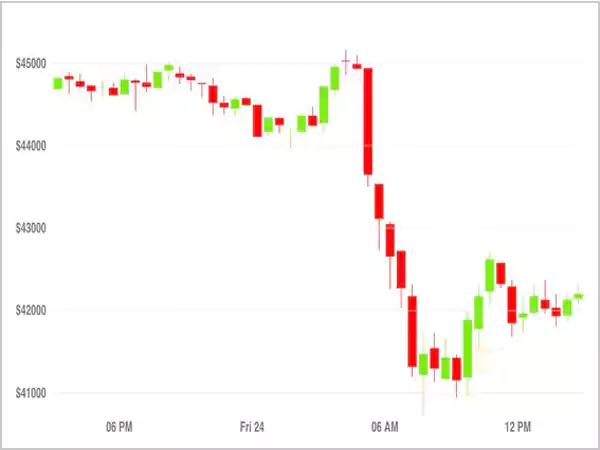https://finanzasdomesticas.com/china-prohibe-las-criptomonedas: Implications of China’s Cryptocurrency Ban

The cryptocurrency market has garnered immense attention in recent years, drawing significant interest from investors, financial institutions, and regulators worldwide. However, recent developments in China—one of the largest cryptocurrency markets—have sent shockwaves through the industry. The decision by the Chinese government to prohibit cryptocurrencies has raised critical questions about the future of digital assets. This article will explore why https://finanzasdomesticas.com/china-prohibe-las-criptomonedas is a key topic in today’s financial discourse, the motivations behind this ban, and its broader implications for the global cryptocurrency landscape.
Short Summary
The article on https://finanzasdomesticas.com/china-prohibe-las-criptomonedas discusses China’s recent decision to ban cryptocurrencies, highlighting the motivations behind this significant move. The ban is aimed at maintaining financial control, protecting consumers, and addressing environmental concerns. The implications of this ban extend globally, affecting market volatility and shifting mining operations to other countries. While the future of cryptocurrencies in China remains uncertain, evolving regulations and public sentiment may lead to changes in policy. As the global cryptocurrency landscape adapts, understanding these developments is crucial for stakeholders in the industry.
Key Takeaways:
- China’s Ban on Cryptocurrencies: The Chinese government has officially prohibited cryptocurrencies to maintain financial control, protect consumers, and address environmental concerns.
- Motivations Behind the Ban:
- Financial Control: Cryptocurrencies operate outside government oversight, complicating regulatory efforts.
- Consumer Protection: High volatility in crypto markets poses risks for individual investors.
- Environmental Issues: Cryptocurrency mining’s significant energy consumption contradicts China’s sustainability goals.
- Financial Stability: Concerns about potential crashes in the cryptocurrency market influencing the broader economy prompted the ban.
- Global Implications: The ban has led to increased market volatility and may shift mining operations to countries with more favorable regulations, such as the U.S. and Canada.
- Future of Cryptocurrencies in China: While the ban is strict, evolving regulations, public sentiment, technological advancements, and geopolitical considerations could lead to future changes in China’s approach to cryptocurrencies.
- Broader Impact: The global cryptocurrency landscape will continue to adapt, with investors reassessing strategies and alternative markets emerging as viable options for trading.
Why China Prohibits Cryptocurrencies

1. Financial Control
The Chinese government has long prioritized maintaining strict control over its financial system. Cryptocurrencies operate in a decentralized manner, posing significant challenges to regulatory oversight. Unlike traditional currencies issued by central banks, cryptocurrencies function independently, making it difficult for the government to monitor transactions effectively.
The Role of Central Bank Digital Currency (CBDC)
In response to the rise of cryptocurrencies, the People’s Bank of China (PBoC) has been developing its own digital currency, known as the Digital Currency Electronic Payment (DCEP). The DCEP aims to provide the government with greater control over the money supply and financial transactions within the country. By prohibiting cryptocurrencies, as detailed in https://finanzasdomesticas.com/china-prohibe-las-criptomonedas, China seeks to protect the integrity of its financial system while promoting its own digital currency.
2. Consumer Protection
Volatility is a defining characteristic of the cryptocurrency market. Rapid price swings can lead to substantial financial losses for individual investors. Reports of scams, fraud, and mismanagement within the crypto space have prompted the government to take a stand. By banning cryptocurrencies, China aims to protect its citizens from the risks associated with investing in these highly speculative assets, a point emphasized in https://finanzasdomesticas.com/china-prohibe-las-criptomonedas.
3. Environmental Concerns
Cryptocurrency mining is notorious for its high energy consumption, raising serious environmental issues. Bitcoin mining, in particular, requires significant computational power, translating to substantial electricity usage. Given China’s commitment to reducing its carbon footprint and transitioning to greener energy sources, the ban on cryptocurrencies aligns with its broader sustainability goals, as highlighted in https://finanzasdomesticas.com/china-prohibe-las-criptomonedas.
4. Financial Stability
The rapid rise of cryptocurrencies has raised concerns about their potential impact on financial stability. The Chinese government is wary that a sudden crash in cryptocurrency markets could spill over into the broader economy, affecting banks and other financial institutions. By prohibiting cryptocurrencies, as outlined in https://finanzasdomesticas.com/china-prohibe-las-criptomonedas, China aims to mitigate these risks and maintain overall economic stability.
Also Read: Crypto30X.Com GG Explained: What You Need to Know Before Getting Started
The Journey to the Ban: A Timeline

Understanding the evolution of China’s stance on cryptocurrencies requires a timeline of significant events:
2013: Initial Warnings
In 2013, the Chinese government first recognized Bitcoin but also issued warnings about its risks. The People’s Bank of China stated that Bitcoin should not be considered a currency and cautioned against its speculative nature.
2017: The First Major Crackdown
In September 2017, the Chinese government banned Initial Coin Offerings (ICOs) and shut down local cryptocurrency exchanges. This marked a turning point, as it effectively restricted trading activities within the country.
2019: Intensified Regulations
The government intensified its regulatory efforts in 2019, targeting cryptocurrency mining operations and warning citizens against investing in digital assets. Local authorities were tasked with closing down mining operations that consumed excessive energy.
2021: Full Ban Implementation
In May 2021, the Chinese government reiterated its crackdown on cryptocurrencies, emphasizing the need to prevent financial risks. By September 2021, the ban was firmly in place, with all cryptocurrency transactions deemed illegal, further reinforcing the discussions around https://finanzasdomesticas.com/china-prohibe-las-criptomonedas.
Also Read: ETSIOSAPP Release Date: What to Expect and Latest Updates
Implications for the Global Cryptocurrency Market

The decision by China to prohibit cryptocurrencies has significant implications for the global market. Here are several potential effects:
1. Market Volatility
China’s actions have historically led to increased volatility in the cryptocurrency market. As one of the largest players in this space, the exit of Chinese investors can create substantial price fluctuations. This volatility can shake investor confidence and lead to rapid sell-offs, affecting the overall market.
2. Shift in Mining Operations
With the ban on cryptocurrency mining in China, many operations may relocate to countries with more favorable regulations. Countries such as the United States, Canada, and Kazakhstan have become more attractive destinations for mining operations. This shift could lead to changes in the geographic landscape of cryptocurrency mining, impacting energy consumption patterns and regulatory frameworks elsewhere.
3. Innovation and Regulation
As countries around the world respond to China’s ban, there may be a surge in innovation within the regulatory space. Other nations might adopt more favorable policies to attract crypto investments and mining operations, creating a competitive environment for digital asset growth.
4. Impact on Blockchain Technology
While the ban on cryptocurrencies is significant, it is essential to note that China has not turned its back on blockchain technology. In fact, the Chinese government has been actively promoting blockchain innovation in various sectors, from supply chain management to digital identity verification. This dual approach could lead to advancements in technology while keeping cryptocurrencies at bay, as discussed in https://finanzasdomesticas.com/china-prohibe-las-criptomonedas.
Global Reactions to the Ban

1. Investor Sentiment
The immediate reaction to China’s ban has been one of caution among global investors. The cryptocurrency market experienced significant downturns in the wake of the news, as uncertainty regarding future regulations mounted. Many investors are now reassessing their portfolios and strategies in light of the ban, particularly as highlighted in https://finanzasdomesticas.com/china-prohibe-las-criptomonedas.
2. Alternative Markets
With China tightening its grip on cryptocurrencies, other markets may emerge as alternatives for trading and investment. Countries with favorable regulations and robust financial infrastructure could see an influx of investors looking to capitalize on the opportunities presented by digital assets.
3. Decentralized Finance (DeFi)
The rise of decentralized finance (DeFi) platforms presents a potential counter-narrative to China’s ban. DeFi platforms allow users to trade and invest without relying on centralized authorities. As users seek alternatives to traditional banking systems, DeFi could see increased adoption, even in regions affected by regulatory challenges.
The Future of Cryptocurrencies in China

Despite the ban, it is essential to consider the future landscape of cryptocurrencies in China. While the government has taken a hardline stance, several factors could influence future developments:
1. Regulatory Evolution
Regulations surrounding cryptocurrencies are not static. As the global landscape evolves, China may reconsider its approach to digital assets. A more nuanced regulatory framework could emerge, allowing for some degree of cryptocurrency activity while maintaining control over financial systems.
2. Public Sentiment
Public sentiment plays a crucial role in shaping government policies. If a significant portion of the population advocates for greater access to cryptocurrencies and digital assets, the government may be compelled to reevaluate its ban. Grassroots movements and public pressure could influence policymakers.
3. Technological Developments
The pace of technological innovation will also impact the future of cryptocurrencies in China. Advances in blockchain technology and digital currencies could lead to new regulatory approaches. The government may seek to harness the benefits of blockchain while addressing the concerns that led to the ban.
4. Geopolitical Considerations
As global competition for technological supremacy intensifies, China may reconsider its stance on cryptocurrencies. In a landscape where nations are vying for leadership in fintech and digital currencies, China may choose to adapt its policies to remain competitive.
Conclusion
The decision https://finanzasdomesticas.com/china-prohibe-las-criptomonedas signifies a critical turning point in the global cryptocurrency narrative. As one of the largest economies takes a firm stance against digital assets, the implications resonate far beyond its borders. Investors, regulators, and technology innovators must navigate a rapidly changing landscape shaped by regulatory actions, market volatility, and technological advancements.
While the immediate effects of the ban are evident, the long-term consequences remain uncertain. The global cryptocurrency community will continue to adapt and innovate, seeking new opportunities in the face of regulatory challenges. Understanding these developments is essential for anyone involved in the evolving landscape of cryptocurrencies, as they will undoubtedly shape the future of digital assets for years to come.
FAQs
Ans: The article at https://finanzasdomesticas.com/china-prohibe-las-criptomonedas details the reasons behind China’s decision to prohibit cryptocurrencies and discusses its implications for the global market.
Ans: According to https://finanzasdomesticas.com/china-prohibe-las-criptomonedas, China aims to maintain financial control, protect consumers, address environmental concerns, and ensure financial stability with this ban.
Ans: The insights provided in https://finanzasdomesticas.com/china-prohibe-las-criptomonedas highlight how the ban could lead to increased volatility in the cryptocurrency market and a shift in investment strategies.
Ans: The article at https://finanzasdomesticas.com/china-prohibe-las-criptomonedas explores potential long-term effects such as regulatory evolution and shifts in cryptocurrency innovation globally.
Ans: For comprehensive insights into China’s cryptocurrency policies and the implications of their ban, visit https://finanzasdomesticas.com/china-prohibe-las-criptomonedas.